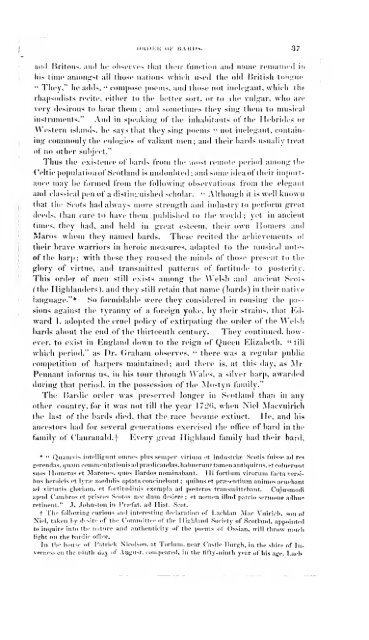A history of the Highlands and of the Highland clans : with an ...
A history of the Highlands and of the Highland clans : with an ...
A history of the Highlands and of the Highland clans : with an ...
Create successful ePaper yourself
Turn your PDF publications into a flip-book with our unique Google optimized e-Paper software.
UKI>Ell OP BAHUS. 37<br />
<strong><strong>an</strong>d</strong> Britons, <strong><strong>an</strong>d</strong> lie observes that <strong>the</strong>ir function <strong><strong>an</strong>d</strong> name remained in<br />
his time atnonf^st all those nations which used tlie old British toiiirue.<br />
" They," he adds, " compose poems, <strong><strong>an</strong>d</strong> those not iiielog<strong>an</strong>t, which <strong>the</strong><br />
rliapsodists recite, ei<strong>the</strong>r to tlie hcttcr sort, or to <strong>the</strong> vulgar, who are<br />
very desirous to hear <strong>the</strong>m ;<br />
<strong><strong>an</strong>d</strong> sometimes tiiev sing <strong>the</strong>m to musical<br />
instruments." And in speaking <strong>of</strong> <strong>the</strong> inhabit<strong>an</strong>ts <strong>of</strong> <strong>the</strong> Hebrides or<br />
Westei'n isl<strong><strong>an</strong>d</strong>s, he says that <strong>the</strong>y sing poems " not ineleg<strong>an</strong>t, contain-<br />
ing commonly <strong>the</strong> eulogies <strong>of</strong> vali<strong>an</strong>t men; <strong><strong>an</strong>d</strong> <strong>the</strong>ir bards usually treat<br />
<strong>of</strong> no o<strong>the</strong>r subject."<br />
Thus <strong>the</strong> existence <strong>of</strong> hards from <strong>the</strong> most remote period among <strong>the</strong><br />
Celtic population <strong>of</strong> Scotl<strong><strong>an</strong>d</strong> is undoubted; <strong><strong>an</strong>d</strong>some idea <strong>of</strong> <strong>the</strong>ir import-<br />
<strong>an</strong>ce may be formed from <strong>the</strong> following observations from <strong>the</strong> eleg<strong>an</strong>t<br />
<strong><strong>an</strong>d</strong> classical pen <strong>of</strong> a distinguished scholar. " Although it is well known<br />
that <strong>the</strong> Scots had always more strength <strong><strong>an</strong>d</strong> industry to perform great<br />
deeds, th<strong>an</strong> care to have <strong>the</strong>m published to <strong>the</strong> world ; yet. in <strong>an</strong>cient<br />
times, <strong>the</strong>y had, <strong><strong>an</strong>d</strong> held in great esteem, <strong>the</strong>ir own Homers <strong><strong>an</strong>d</strong><br />
Maros wlioni <strong>the</strong>y named bards. These recited <strong>the</strong> achievements <strong>of</strong><br />
<strong>the</strong>ir brave wiirriors in heroic measures, adapted to <strong>the</strong> musical notes<br />
<strong>of</strong> <strong>the</strong> harp; <strong>with</strong> <strong>the</strong>se <strong>the</strong>y roused <strong>the</strong> minds <strong>of</strong> those present to <strong>the</strong><br />
glory <strong>of</strong> virtue, <strong><strong>an</strong>d</strong> tr<strong>an</strong>smitted patterns <strong>of</strong> fortitude to posterity.<br />
This order <strong>of</strong> men still exists among <strong>the</strong> Welsh <strong><strong>an</strong>d</strong> <strong>an</strong>cient Scots<br />
T<strong>the</strong> Highl<strong><strong>an</strong>d</strong>ers), <strong><strong>an</strong>d</strong> <strong>the</strong>y still retain that name (bards) in <strong>the</strong>ir native<br />
l<strong>an</strong>guage."* So formidable were <strong>the</strong>y considered in rousing <strong>the</strong> pas-<br />
sions against tiie tyr<strong>an</strong>ny <strong>of</strong> a foreign yoke, by <strong>the</strong>ir strains, that Edward<br />
I. adopted <strong>the</strong> cruel policy <strong>of</strong> extirpating <strong>the</strong> order <strong>of</strong> <strong>the</strong> Welsh<br />
bards about <strong>the</strong> end <strong>of</strong> <strong>the</strong> thirteenth century. Tiiey continued, how-<br />
ever, to exist in Engl<strong><strong>an</strong>d</strong> down to <strong>the</strong> reign <strong>of</strong> Queen Elizabeth, " till<br />
which period," as Dr. Graham observes, " <strong>the</strong>re was a regular public<br />
competition <strong>of</strong> harpers maintained; <strong><strong>an</strong>d</strong> <strong>the</strong>re is, at this day, as Mr<br />
Penn<strong>an</strong>t informs us, in his tour tbrougli \Vales, a silver harp, awarded<br />
during that period, in <strong>the</strong> possession <strong>of</strong> <strong>the</strong> Mostyn family."<br />
The Bardic order was preserved longer in Scotl<strong><strong>an</strong>d</strong> th<strong>an</strong> in <strong>an</strong>y<br />
o<strong>the</strong>r country, for it was not till <strong>the</strong> year 172G, when Niel Macvuirich<br />
<strong>the</strong> last <strong>of</strong> tlie b.irds died, that <strong>the</strong> race became extinct. He, <strong><strong>an</strong>d</strong> his<br />
<strong>an</strong>cestors had for several generations exercised <strong>the</strong> <strong>of</strong>fice <strong>of</strong> bard in <strong>the</strong><br />
family <strong>of</strong> Cl<strong>an</strong>r<strong>an</strong>ald.-f- Every great Highl<strong><strong>an</strong>d</strong> family had <strong>the</strong>ir bard,<br />
• " Qu<strong>an</strong>ivis intpUiffiint omnes y>liis semper viriuin et industrise Scotis ftlisse art ren<br />
gerenrtas, quam oommentationisadprjerticaiirtas. habnerunt tamen<strong>an</strong>tlqiiitus, etcoluerunt<br />
siios Homeros et Marones, quos Bardoa nominab<strong>an</strong>t. Hi fortnim virorum facta versitius<br />
heroicis et IjTje modulis aptata concineb<strong>an</strong>t ; quibus et priesentium <strong>an</strong>imos acueb<strong>an</strong>t<br />
ad virtutis gloriam, et fortitudinis exempla ad posteros tr<strong>an</strong>smittebatit. Cujusmodt<br />
apud Cambros et priscos Srot03 nee dum desin-e ; et nonien illud patrio sermone adhii*;<br />
retineiit." J. Johnston in Praefat. ad Hist. Scot.<br />
f The following curious <strong><strong>an</strong>d</strong> interesting declaration <strong>of</strong> Lachl<strong>an</strong> Mac Vuiricb. son <strong>of</strong><br />
Niel, taken by desire <strong>of</strong> tlie Committee <strong>of</strong> <strong>the</strong> Highl<strong><strong>an</strong>d</strong> Society <strong>of</strong> Scotl<strong><strong>an</strong>d</strong>, appointed<br />
to inquire into <strong>the</strong> nature <strong><strong>an</strong>d</strong> au<strong>the</strong>nticity <strong>of</strong> <strong>the</strong> poems <strong>of</strong> Ossi<strong>an</strong>, will throw much<br />
light on <strong>the</strong> bardic <strong>of</strong>fice.<br />
In llip house <strong>of</strong> Pati-ick Nicolson, at Torlum, near Castle Burgh, in <strong>the</strong> shire <strong>of</strong> In.<br />
»»rness on <strong>the</strong> ninth day "f August, compeared, in <strong>the</strong> tifty-ninth year <strong>of</strong> his age, Lach-

















